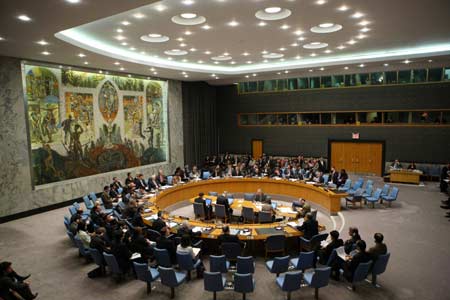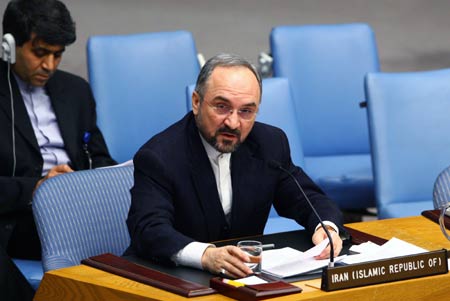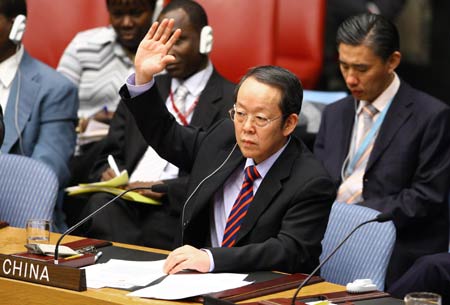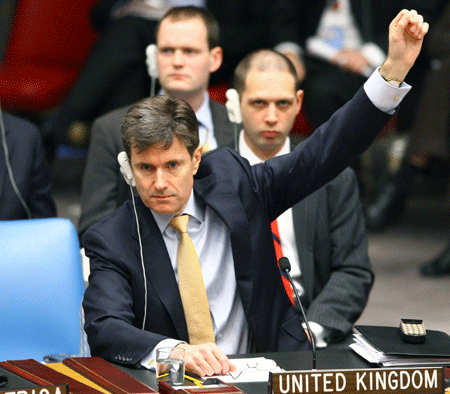The United Nations Security Council adopted a resolution on Monday slapping stronger sanctions to press Iran to suspend its uranium enrichment activities.

The United Nations Security Council adopted a resolution on Monday slapping stronger sanctions to press Iran to suspend its uranium enrichment activities.
Fourteen of the 15 members of the Security Council voted for Resolution 1803 but Indonesia abstained, a departure from two previous sanctions resolutions on Iran, which enjoyed unanimous support.
The new sanction measures include travel restrictions and bans for more Iranians, an expansion of asset freezes, curbs on dual-use items, export credit, financial monitoring, cargo inspections on aircraft and vessels, and possible "next steps."

Mohammad Khazee, Iran's ambassador to the United Nations addresses members of the Security Council before the Council voted to increase sanctions against Iran at U.N..
Chinese Ambassador Wang Guangya, addressing the council after the vote, said the new resolution "reflects not only the international concern over the (Iranian nuclear) issue, but also the expectations of all parties on an early peaceful settlement of the issue through diplomatic negotiations."
While welcoming Tehran's cooperation with the International Atomic Energy Agency (IAEA), Wang cited the latest IAEA report which pointed out Iran's failure to suspend uranium enrichment activities as required by previous UN Security Council resolutions, and its start of developing new generation centrifuges and continued construction of heavy water reactor and production of heavy water and that "the possible military dimension of Iran's nuclear program remains outstanding."
"As the impasse on the Iranian nuclear issue is not yet broken, the international community is increasingly calling for strengthened diplomatic efforts and hopes that the parties concerned can find a breakthrough point soon and bring the issue back onto the track of settlement," the Chinese ambassador said.

Chinese Ambassador Wang Guangya votes for the sanctions resolution on Monday. He said the new resolution is not aimed at punishing Iran but urging Tehran to return to the negotiating table and thus to reactivate a new round of diplomatic efforts.
He sand the new resolution is not aimed at punishing Iran but urging Tehran to return to the negotiating table and thus to reactivate a new round of diplomatic efforts.
"The sanction measures are not targeted at the Iranian people and will not affect the normal economic and financial activities between Iran and other countries," Wang said.
"All the sanction measures are reversible," he said. "If Iran suspends uranium enrichment and reprocessing activities and complies with the relevant IAEA and Security Council resolutions, the sanctions will be suspended, and even terminated."
Wang reiterated China's stance that sanctions can never resolve the Iranian nuclear issue fundamentally. "It can only serve as a means to promote reconciliation and negotiations."
"The best way to resolve the issue is still diplomatic negotiations," he said. "We call upon all parties concerned to adopt a highly responsible and constructive attitude, show necessary flexibility as appropriate, give full play to their initiative and creativity, and demonstrate determination and sincerity in resuming negotiations."
He urged Iran to fully comply with IAEA and Security Council resolutions as soon as possible.
Wang noted that the foreign ministers of Britain, China, France, Germany, Russia and the United States have issued a joint statement reiterating their commitment to resolving the issue through diplomatic negotiations and expressing their readiness to strengthen diplomatic efforts and adopt creative approaches to vigorously facilitate resumption of negotiations.

The United Nations Security Council adopted a resolution on Monday slapping stronger sanctions to press Iran to suspend its uranium enrichment activities.
The statement of the foreign ministers of the six countries, read by British Ambassador John Sawers after the vote, said Resolution 1803 reflected "the international community's ongoing serious concerns about the proliferation risks of the Iranian nuclear program."
"We remain committed to an early negotiated solution to the Iranian nuclear issue and reaffirm our commitment to a dual-track approach," the statement said. "We remain ready to negotiate future arrangements, modalities and timing ... once the conditions for negotiations have been established."
Wang said China hopes all parties concerned would "seize the opportunity, engage themselves in closer contacts and dialogue on the basis of equality and mutual respect, increase mutual trust and reduce misperceptions, address each other's concerns and seek an approach that is acceptable to all for the resumption of negotiations."
Vote on the new resolution, originally scheduled for Saturday, was delayed till Monday to address reservations by Indonesia, Vietnam, South Africa and Libya so that a unanimity could be achieved.
In statements delivered Monday before the vote, representatives from Libya, South Africa and Vietnam reiterated their reservations but said they would vote for the resolution.

The United Nations Security Council adopted a resolution on Monday slapping stronger sanctions to press Iran to suspend its uranium enrichment activities.
Indonesian Ambassador Marty M. Natalegawa, for his part, said his country decided to abstain because it believes Iran is cooperating with the International Atomic Energy Agency (IAEA) and that "at this juncture, more sanctions are not the best course."
"We are not convinced whether more sanctions, however incremental, well targeted and reversible, would move us forward in resolving the question of Iran's nuclear program, or whether it will only give potential negative impact at a time when progress is being made," Natalegawa said.
Prior to the vote, Iranian Ambassador Mohammad Khazaee addressed the council, saying Tehran's nuclear program "has been, is, and will remain absolutely peaceful and in no way poses any threat to international peace and security."
Khazaee rejected the Security Council's requirement that it suspend its uranium enrichment activities, branding it as "legally defective and politically coercive."
He described the Security Council decision on Monday as "unjust and irrational."
(Xinhua News Agency March 4, 2008)